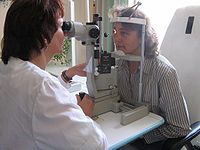
Photo from wikipedia
Introduction To determine if differences exist between pediatric ophthalmologists and uveitis ophthalmologists in the treatment of pediatric uveitic cataracts and placement of intraocular lenses. Methods Uveitis ophthalmologists and pediatric ophthalmologists… Click to show full abstract
Introduction To determine if differences exist between pediatric ophthalmologists and uveitis ophthalmologists in the treatment of pediatric uveitic cataracts and placement of intraocular lenses. Methods Uveitis ophthalmologists and pediatric ophthalmologists were surveyed via an online poll regarding their therapeutic management of pediatric uveitic cataract and intraocular lens (IOL) placement. Results Sixty-two responses from uveitis ophthalmologists and 47 responses from pediatric ophthalmologists were recorded. According to 79% of all responses, uveitis was not a contraindication for primary IOL implantation in patients with controlled intraocular inflammation. Pediatric ophthalmologists were more likely to respond that the presence of chronic juvenile idiopathic arthritis-associated iridocyclitis, pars planitis, or recurrent acute anterior uveitis is a contraindication for primary IOL implantation in pediatric cases with full control of intraocular inflammation. There was no consensus within either specialty with regard to the preferred IOL material for lens implantation. Uveitis ophthalmologists were more likely to report the use of intravenous and intravitreal steroids for perioperative treatment. In cataract surgery for a child with recurrent acute anterior uveitis, a higher percentage of uveitis ophthalmologists (71%) than pediatric ophthalmologists (50%) responded that the posterior capsule should be primarily opened. A higher percentage of uveitis ophthalmologists also stated that anterior vitrectomy should be performed at the time of cataract surgery in all three uveitis types. Conclusions Pediatric ophthalmologists and uveitis ophthalmologists have similar approaches to the management of pediatric uveitic cataract removal and IOL insertion, but several differences remain between these subspecialties. Continued collaboration between the subspecialties would be helpful to better develop consistent criteria to improve patient care.
Journal Title: Ophthalmology and Therapy
Year Published: 2020
Link to full text (if available)
Share on Social Media: Sign Up to like & get
recommendations!